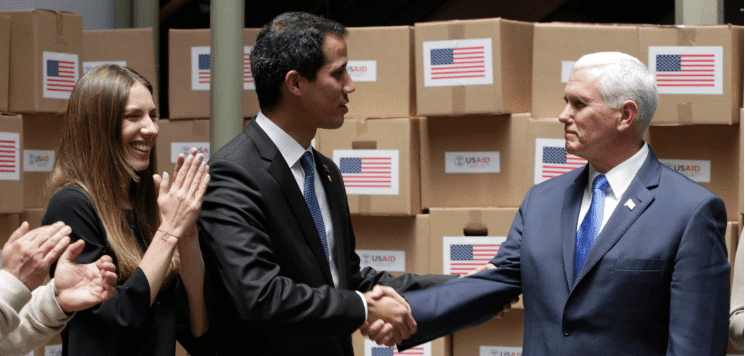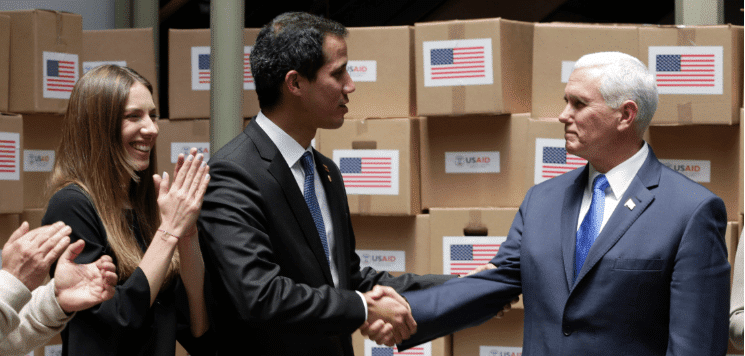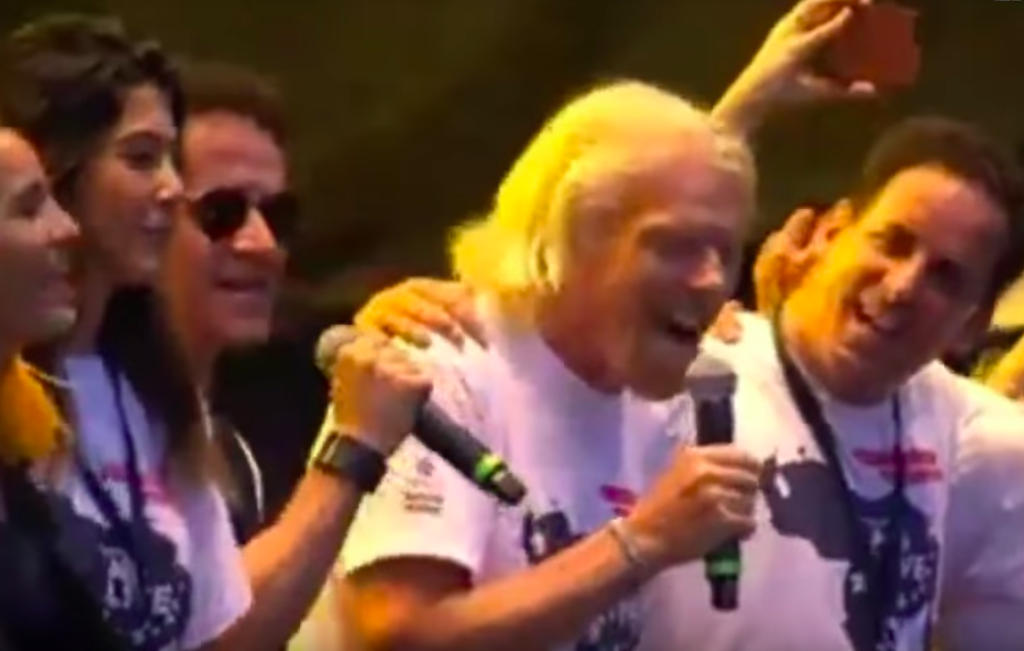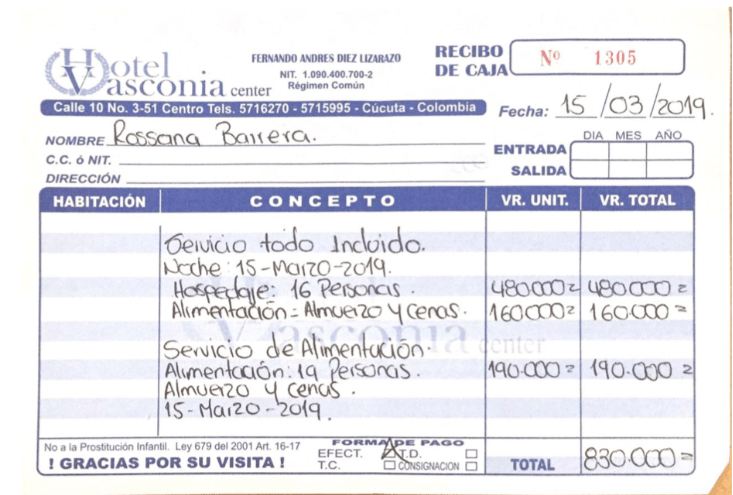
A new investigation has exposed members of Venezuelan coup leader Juan Guaidó’s inner circle for embezzling tens of thousands of dollars designated for humanitarian aid and spending it on luxury goods and lavish accommodations for themselves. Guaidó had been aware of the fraud for weeks and stubbornly defended his cohorts until a leak from Colombian intelligence forced him to acknowledge the scandal.
The scandal unfolded this February, when Venezuelan opposition figures and their supporters descended upon the border town of Cúcuta, Colombia for what was billed as a Live Aid concert to raise millions of dollars for humanitarian aid for Venezuelans suffering the effects of an economic crisis.
The operation was supposed to have climaxed with a Live Aid concert hosted by billionaire Virgin Group founder Richard Branson while trucks full of US aid blasted across the Venezuelan border. Instead, as Branson gathered his performers on stage for a cringeworthy rendition of John Lennon’s “Imagine,” opposition hooligans set fire to the truckloads of aid with molotov cocktails as they failed to reach the border.
Now, a report by the staunchly anti-Maduro PanAm Post editor-in-chief Orlando Avendaño has revealed a shocking scheme of fraud and embezzlement behind the aid imbroglio. According to Avendaño, Guaidó’s lieutenants embezzled huge sums of money that had been promised to Venezuelan soldiers who deserted their positions and snuck across to the Colombian side at Guaidó’s urging.
The cash that was used to entice desperate soldiers and would-be mercenaries to defect became a slush fund for the US-backed coup leader and his gaggle, who spent it lavishly on hotels, expensive dinners, nightclubs and designer clothes. As Guaidó’s gang lived the high life, he covered for their fraud, keeping his lips sealed until it was exposed through a leak by the Colombian intelligence services.
At a press conference on June 17, Guaidó attempted to downplay his responsibility and redirect public anger back towards Maduro. “The government does not manage [public] resources because we are in the process of transition,” he said. “The dictatorship has begun a process of disinformation.”
But then the defecting Venezuelan soldiers announced plans for a press conference where they pledged to provide even more evidence of fraud.
Constructing an interventionist sham show
It was apparent upon Branson’s announcement of the February 23rd aid concert that the event had little to do with providing relief to hungry Venezuelans. It was a transparent propaganda stunt engineered to destabilize the Maduro government and achieve a long-standing US foreign policy goal.
As Father Sergei San Miguel, a Colombian government-affiliated priest responsible for guiding the deserting Venezuelan soldiers told me in Cúcuta, the successful entrance of the meager amount of supplies into Venezuela was intended to demonstrate Maduro’s loss of sovereignty in front of the global stage and foment an uprising across the country that would finally depose him.
Branson pledged that his event would rustle up 100 million dollars for humanitarian aid. But organizers had omitted how and to whom the funds would be distributed. On February 28th, Venezuela Aid Live organizers announced they had raised just 2.5 million dollars – a tiny fraction of the sum they had promised and likely less than the cost of staging a massive production on one week’s notice.
Richard Branson singing John Lennon’s “Imagine” with performers at his Live Aid concert in Colombia
The weekend of the concert offered a preview of this month’s corruption revelations, with several embarrassing incidents involving Guaidó’s confidantes. Early in the morning of February 23, Popular Will party members Freddy Superlano and his cousin and assistant Carlos José Salinas were found unconscious in a motel in Cúcuta. According to police reports, the two had been drugged with scopolamine and robbed by women, presumably prostitutes, they met in the red-light district. After the women made an early morning dash from the motel room, staff found the two men unconscious and called police. Salinas died shortly after being hospitalized.
Days later, another top Venezuelan opposition figure, Lorent Saleh, was arrested in Cúcuta after he allegedly attempted to sexually abuse two women. He was released after figures close to Guaidó mediated with Colombian authorities. Saleh – a recipient of funds from the US government under the guise of “democracy promotion” – had previously been deported by Colombia to Venezuela after plotting terrorist attacks and assassinations in the latter country.
“Colombian police arrest Lorent Saleh, who under the influence of drugs had tried to sexually abuse two women. Then they left him free through the mediation of people close to Juan Guaidó” via @MaisantaDigital pic.twitter.com/4Nn7D5a9NK
— Dan Cohen (@dancohen3000) February 26, 2019
But the revelations of fraud are a new level of embarrassment for the Guaidó coup operation, and threaten to undercut support both inside Venezuela and from his foreign patrons. The fraud scheme was revealed through leaked receipts and documents obtained by Colombian intelligence as part of an ongoing investigation. The receipts Avendaño published show Guaidó’s representatives blew more than $125,000 on luxury goods and personal expenses, including nearly $40,000 on expenses in April. Avendaño has yet to publish all of the documents he received, so the total that was stolen remains unknown.
One of many hotel receipts obtained by Avendaño showing how Guaido’s representatives spent the aid money
Suckering the soldiers
Popular Will party members Rossana Barrera and Kevin Rojas are the main subjects of the corruption investigation. Barrera replaced Roberto Marrero as Juan Guaidó’s chief of staff after Marrero was arrested by the Venezuelan government on charges of plotting terrorist attacks. Rojas, for his part, is the regional coordinator of the Popular Will party in the border state of Tachira, and had been denounced for his role in violent destabilization plots by the state’s former governor, Jose Vielma Mora.
For months, Popular Will party parliamentarians Dr. José Manuel Olivares and Gaby Arellano had been tasked with overseeing the aid operations, and according to Avendaño, Olivares was preparing for a collapse in the military’s command and control structure on the border that would allow the opposition to ram the aid trucks through.
Yet Olivares and Arellano were replaced without explanation on direct orders from Guaidó. I reached out to Olivares via Whatsapp for comment, but he declined to respond. However, the two released a statement expressing confidence in the investigation while blaming their disgraced counterparts, Barrera and Rojas.
“We don’t have any responsibility with respect to the soldiers that are in Colombian territory that began to enter on February 23rd through the bridges where we were,” they remarked. “We must highlight that the person in charge of this process of the Venezuelan officers into Colombian territory is the ambassador, Humberto Calderón Berti, and the president’s appointees in Cúcuta: Kevin Rojas and Rossana Barrera.”
While the attempt to push aid trucks across Venezuelan borders was a resounding failure, the desertion by scores of Venezuelan soldiers to Guaidó’s cause was spun as a major success. Soon, Guaidó and his partymates promised, thousands more soldiers would break ranks and Maduro’s government would dissolve. The soldiers had been promised amnesty and stays in hotels, schooling for their children, medical care and employment. Chilean president Sebastián Piñera even offered renewable one-year visas with the possibility of permanent residency.
On February 25th, I spoke to three defector soldiers in Bogotá who expressed optimism that Maduro would soon be ousted and their conditions would improve dramatically. “This country has extended its hand and helps us,” Sergeant Major Jose Luis Suarez told me. “As a Venezuelan soldier, I’m very thankful to Colombia.”
At first, the turncoat soldiers were put up in nine hotels in Cúcuta at $30,000 per night, paid for by the Colombian Ministry of Foreign Affairs, the United Nations High Commissioner for Refugees and Juan Guaidó’s ad hoc Humanitarian Aid Coalition.
However, just one day after they arrived, representatives from the Coalition for Humanitarian Aid in Cúcuta told soldiers to stop coming across the border because they were in “a complicated situation” with an insufficient budget.
Optimism soon turned to outrage as the benefits the soldiers had been promised failed to materialize. By mid-March, funds for the deserters had completely dried up. The UNHCR attempted to expel a group of soldiers from one shelter, giving each a stipend of 350,000 Colombian pesos ($106), a mat, and a sheet to sleep on.
“We are desperate. We do not want to stay in Colombia, we want to return to Venezuela, but not in the conditions that are being lived now. We do not know what to do,” one deserter complained.
The soldiers’ families paid an especially heavy toll. Several of their wives were pregnant and were denied access to medical attention. One woman was forced to give birth in an emergency room and could not pay for a taxi to leave. The 130 children of the deserters were so poorly fed that twenty percent were assessed to be suffering from malnutrition.
Unable to work, some defectors joined paramilitaries and drug trafficking operations along the Colombian-Venezuelan border and received training in high-powered weapons. Others drank away their misery, descended into violence and cast about for prostitutes.
By the beginning of May, Guaidó’s representatives had cut off all communication with the soldiers. Having sold out in pursuit of promises that turned out to be hollow, the lost army was set to turn on Guaidó’s gaggle.
‘Transparency above all!’
According to Avendaño’s report, the two Popular Will figures appointed to oversee the funds and payment for the lodging of the deserters – Barrera and Rojas – spent 3,000,000 pesos ($915 USD) each night on hotels and nightclubs.
“About a thousand dollars in drinks and meals. Clothing expenses in very expensive stores in Bogotá and in Cúcuta. Vehicle rental reports and hotel payments at surcharge. Silver flowing. A lot of money,” the journalist wrote.
Barrera told the Popular Will leadership in Caracas that the funds were being dispersed among seven hotels that were providing housing for deserters and their families, but only two hotels had actually been paid.
What’s more, Guaidó’s representatives had falsely claimed there were more than 1,450 Venezuelan soldiers in Colombia. According to Avendaño, Colombian intelligence counted only 700. It turned out that Barrera and Rojas had inflated the number in order to embezzle more funds for their luxury spree.
In mid-May, Barrera and Rojas attempted to defraud even more money through a phony charity dinner in a luxurious Bogotá restaurant, falsely claiming the event had been convened to raise money for deserters and their families. Using a fake email account for Guaidó’s “ambassador” in Colombia, Humberto Calderón Berti, the two Popular Will activists invited representatives from foreign embassies, including those of the US and Israel. The dinner was cancelled after Berti’s representatives informed embassies that they were not sponsoring the dinner.
By then, the reckless behavior of Guaidó’s appointees was known throughout the entire Colombian government. Soon after Barrera and Rojas were quietly removed from their positions.
Shortly after Avendaño’s article was published, it became clear to Guaidó that he could no longer shield the con artists he placed in charge of the aid operation. After ordering Berti to ask Colombian authorities for their investigation, he took to Twitter to declare, “Transparency above all!”
Minutes later, Berti announced he would get to the bottom of the case. The coup ambassador tweeted that the investigation was in its final phase, provoking many observers to point out that he and Guaidó had known about the fraud for months and covered it up. Shockingly, Berti confirmed the cover-up, responding that he had personally ordered the investigation two months ago after receiving information from Colombian intelligence.
At a June 17th press conference, Guaidó claimed that he immediately requested an investigation when Berti informed him of the fraud schemes. But according to Avendaño, Guaidó “showed a stubborn defense of both” of his disgraced party lieutenants, using blustery threats to shift blame onto his “embassy” in Colombia. Avendaño attempted to contact Guaidó and his press officer, but received no response.
“They will burn it, I imagine”
While the money intended for defecting soldiers padded the pockets of Popular Will leaders, hundreds of tons of food donated by the USAID and other countries that was stored in Cúcuta wound up rotting. The figure Guaidó had appointed as his liaison to USAID was Venezuelan businessman Miguel Sabal.
Sabal is the president of the Present Future Association, which was founded by Popular Will member Yon Goicoechea after he won $500,000 from the Koch Brothers through the Cato Institute’s Milton Friedman Prize for Advancing Liberty. Back in 2010, Sabal participated in the Mexican Fiesta plot along with Guaidó and others where they received training from the CANVAS regime change group and plotted the assassination of Maduro.
After the February 23 aid operation floundered, Sabal let the food rot in the steaming tropical heat. “Everything [Chilean] President Piñera sent is no longer useful,” a source told Avendaño. “It’s there. They do not know what to do with it [the rotten food] so that a scandal is not created. They will burn it, I imagine.”
When I was in downtown Cúcuta last February, I saw desperation at every turn. Impoverished Venezuelan migrants could be found on street corners begging for money and food. Many had left Venezuela hoping for better conditions in Colombia only to find a situation that was at least as dire. One pregnant woman told me she was considering giving away her baby in order to give it a better life. Rather than hand the aid to the migrants around Cúcuta, Guaidó’s representatives apparently chose to burn it.
For exposing the corruption in Guaidó’s inner circle, Avendaño has received an onslaught of hatred and harassment from opposition figures. The pushback has forced the anti-Maduro journalist into a defensive crouch.
“It has cost me, it has deeply hurt me, to publish something that, I knew, would have immense consequences,” he wrote. “But I would never have forgiven myself that I had known that some traded in the misery of others, and not published it.”
For Guaidó, the fall out is already beginning. Organization of American States (OAS) Secretary General Luis Almagro – an anti-Maduro fanatic who has transformed the OAS into a playground for Venezuela’s opposition – has called for a full investigation. It is hard to see how an already deflated Guaidó will be able to recover from this massive blow to his credibility as a self-proclaimed reformer. While Guaidó’s support in the streets of Venezuela is rapidly deteriorating, the Trump administration has yet to address the scandal and continues to voice strong support for their man in Caracas.
Reprinted with permission from The Grayzone.
Support The Grayzone here.



